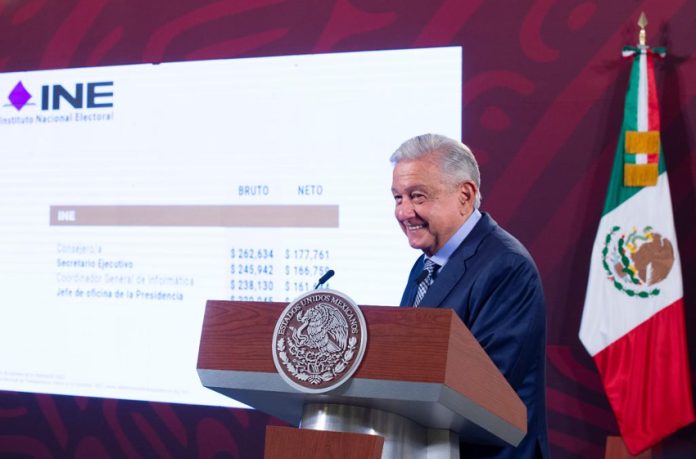The day before hundreds of thousands of people protested his electoral reform, President López Obrador had something completely different on his mind: aluxes – sprites that inhabit the Yucatán Peninsula, according to Mayan folklore.
On his social media accounts last Saturday, he shared a photo “taken by a [Maya Train] engineer three days ago” that purported to show one of the mythical creatures. In addition to going viral, his (tongue in cheek?) Facebook and Twitter posts spawned countless media reports, including articles by The Associated Press and The New York Times.
Hace poco, en el carnaval de Hecelchakán, Campeche, hicieron una representación de lo mismo. El pueblo del sureste se apropió del Tren Maya. Es —como dirían los que hablan “físico”— parte del imaginario colectivo. 2/2 pic.twitter.com/CeHhpQTuxe
— Andrés Manuel (@lopezobrador_) February 26, 2023
AMLO also shared this video of a carnival in Campeche where a representation of the Maya Train was part of the festivities.
Monday
The general director of the state-owned, military-run Maya Train company announced early in the mañanera that the new 1,554-kilometer-long railroad would begin operations on Dec. 1.
Óscar Lozano Águila said the company he heads would take possession of the first train on July 8 and subsequently begin tests to ensure that the railroad – which will link cities and towns in Tabasco, Campeche, Yucatán, Quintana Roo and Chiapas – is ready for service on the slated opening date.
At the top of his presser, AMLO asserted that the rail project is the most important in the world in several respects.
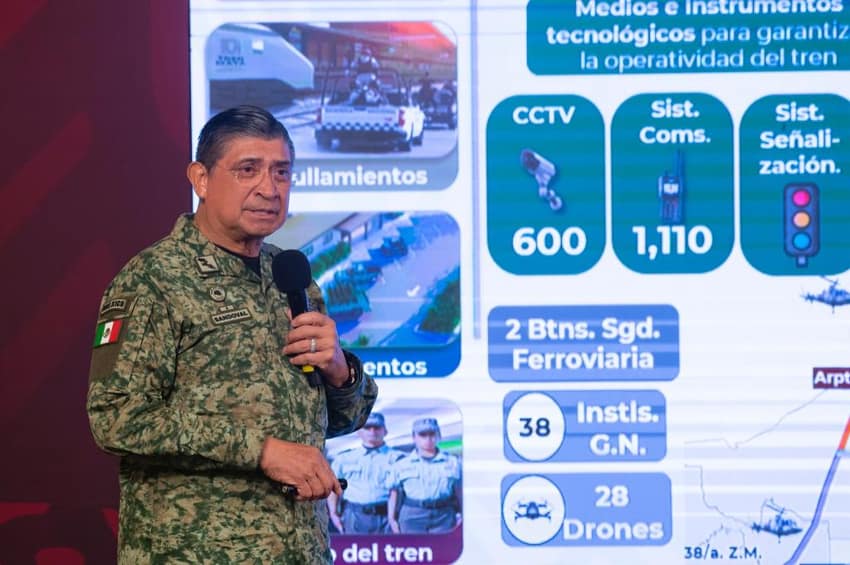
“There is nothing anywhere in the world like this project [in terms of] its ecological, touristic, archaeological, cultural and artistic importance,” he said. “We’re talking about the connection of ancient Mayan cities of the great Mesoamerican nation. There is no other region like it in the world.”
In response to his first question of the week, López Obrador said that attendees at Sunday’s demonstrations against the recently-approved electoral reform and in defense of the National Electoral Institute (INE) are opposed to the “transformation of the country” his government is carrying out.
“They want to keep stealing, … they want to keep the majority of Mexicans on the margins, in oblivion,” he said.
The president also said that the majority of “the leaders who organize these marches and those who participate” were part of previous governments.
“They’ve been defenders of electoral frauds, formed part of the corruption in Mexico, belonged to the narco-state that, as has been shown with the García Luna matter, was imposed during two six-year periods of government, that of Vicente Fox and that of Felipe Calderón,” he said.
“When they say ‘don’t touch the INE,’ what they’re thinking is don’t touch corruption, don’t touch privileges, don’t touch the narco state.”
López Obrador later added to his criticism of the Peruvian government led by Dina Boluarte, who succeeded the ousted Pedro Castillo last December.
“We don’t accept the whole farce … [of] the removal of president Pedro Castillo because the will of the people of Peru wasn’t respected, democracy was trampled on and a great injustice was committed by dismissing and jailing him and then establishing an authoritarian, repressive government,” he said.
“… An oligarchy in Peru, national but mainly foreign, is looting the natural resources of Peru – gas, mineral resources – and they need a puppet, … a ruler and a Congress to suit their needs,” López Obrador added.
Abruptly bringing his press conference to a close, the president revealed he had a call scheduled with Elon Musk, CEO of electric vehicle manufacturer Tesla.
“I want to be punctual for … what’s it called? A teleconference, yes, and I’ll tell you about it tomorrow.”
Tuesday
Deputy Health Minister Hugo López-Gatell – a household name in Mexico due to his leadership of the government’s pandemic response – noted that it was three years to the day since the first COVID case was confirmed here.
“Throughout these three years the epidemic has been characterized by a series of waves, or rises and falls in the intensity of transmission,” he said.
The coronavirus czar said that the sixth wave was continuing to recede, but the pace of the descent had slowed in the past four weeks.
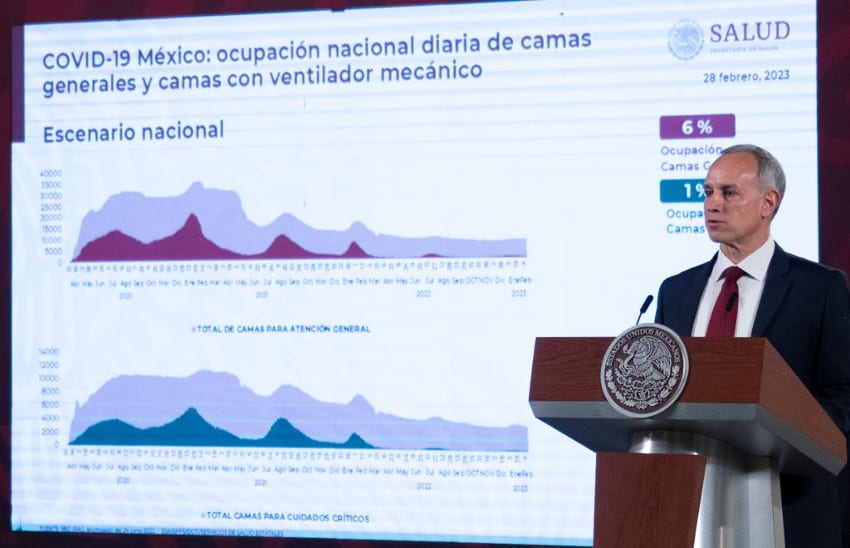
Continuing the government’s health update, the director of the Mexican Social Security Institute (IMSS) said that IMSS hospitals would seek to retain the services of 5,600 specialist doctors who recently completed their residencies.
“Starting tomorrow we’re going to … offer them a labor option so that they continue working but with new conditions and new opportunities,” Zoé Robledo said.
He said that the number of IMSS training hospitals had increased from 200 to 400, allowing the public health care provider to train and retain more specialists.
López Obrador later remarked that “the right to health” is guaranteed across Mexico, even in “the most remote communities.”
“… I reaffirm the commitment that this year we will complete a universal, effective and free health system, the Denmark commitment still stands,” he added, referring to an ambitious – and likely unachievable – pledge to have a system comparable to that in the Scandinavian country.
“[Denmark] has a good health system. In Denmark what is known as the welfare state is established and that’s what we want to establish in Mexico. In Denmark, you have a pension when you turn 65, the entire health system is free, education is public and free, students are granted scholarships,” López Obrador said.
“That’s the welfare state; it’s guaranteeing humans protection from the cradle to the grave, that’s the responsibility of the state.”
Keeping his word, AMLO updated reporters on his conversation with Elon Musk.
Tesla, he announced, would build a plant in Monterrey under an agreement that includes “a series of commitments to address the problem of water scarcity” in Nuevo León.
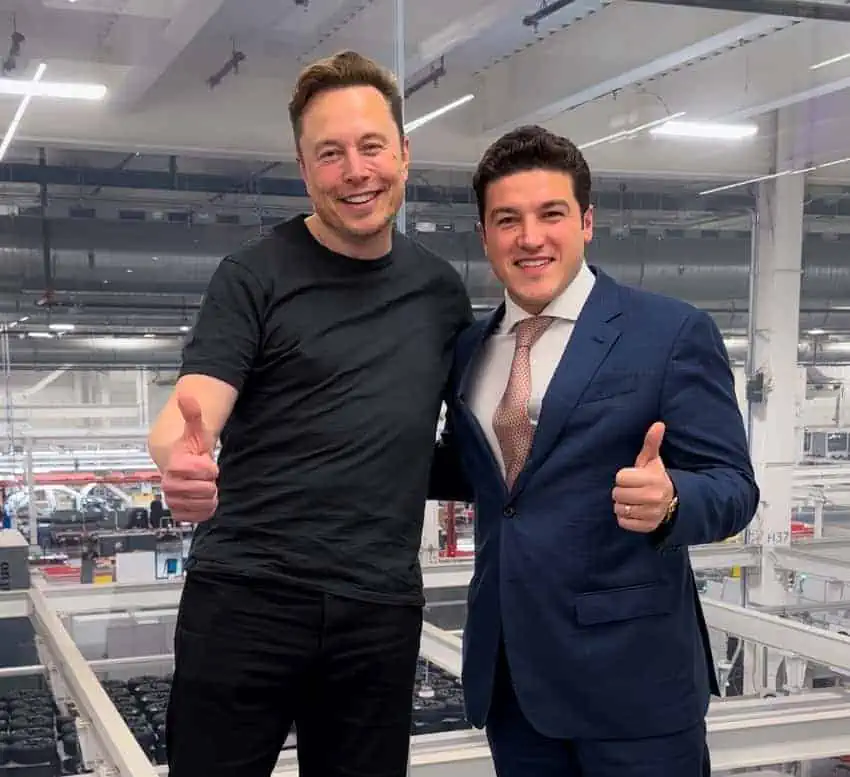
“I spoke with Elon Musk on two occasions via videoconference, Friday night from Chetumal and yesterday morning. He was very receptive, understanding our concerns and accepting our proposals,” López Obrador said.
In a change of tone, the president railed against the United States “meddling” in Mexico’s affairs via a Department of State press release commenting on the protests against the recently-approved electoral reform package.
“With all respect I say to Mr. [Antony] Blinken of the State Department that there is currently more democracy in Mexico than in the United States,” he said. “… When I say that we have more democracy than them it’s because the people rule here and the oligarchy rules there.”
Wednesday
AMLO opened his third mañanera of the week with an encapsulation of his government’s purpose.
“We’re working to transform Mexico from below and with the people,” he said before handing the reins to fake news prospector Ana Elizabeth García Vilchis.
García, who has been presenting the weekly “Who’s who in the lies of the week” segment since 2021, took aim at a headline in the Reforma newspaper, a favorite punching bag of her boss. The headline – US Congress: AMLO is sabotaging democracy – is not an accurate description of the content of the story, she bemoaned.
“It indicates that the Congress of the United States asserted that the president of Mexico is sabotaging democracy, but that headline is a lie. In reality they’re two members of Congress out of 535 federal lawmakers in the United States. One of those is Bob Menendez, a Democratic Party senator of Cuban origin and a known enemy of leftist governments in Latin America, and [the other is] Republican Party representative Michael McCaul, an avowed anti-Mexican and supporter of the border wall,” García said.
“It’s obviously not true that the U.S. Congress has made a statement on the electoral reform in Mexico,” she said.
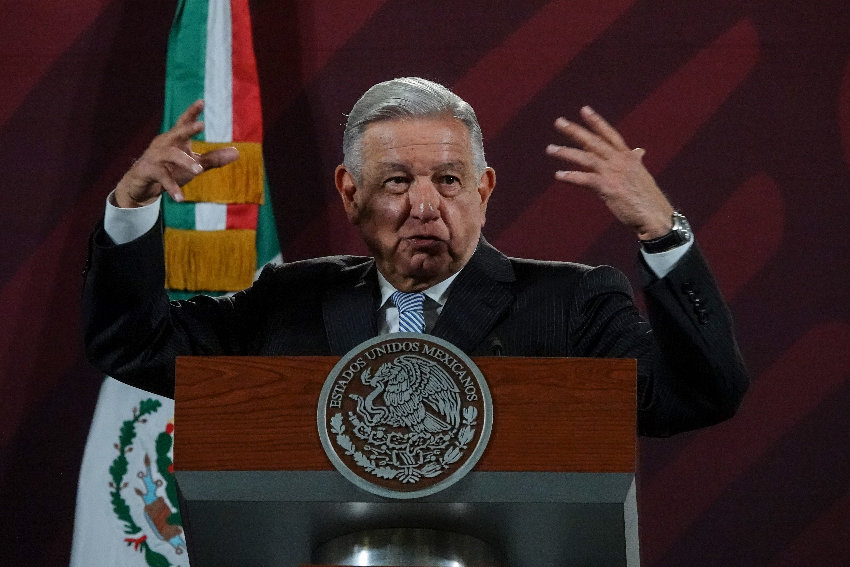
Back at the helm of his presser, López Obrador offered his view on a judge’s decision to invalide a warrant for the arrest of former Tamaulipas governor Francisco García Cabeza de Vaca on organized crime and money laundering charges.
“It’s part of the decadence of the judicial power. It hasn’t been possible to reform this power, which comes from the old regime and is … plagued by corruption,” he said.
“… Unfortunately there is protection for common criminals … and protection for white collar criminals … – they were the favorite sons of the old regime. Hopefully the judicial power reforms itself.”
Asked about Mexican soldiers’ alleged murder of five young and apparently unarmed men including a United States citizen in Nuevo Laredo, Tamaulipas, last Sunday, López Obrador said that the government had asked the National Human Rights Commission to conduct an investigation and that military authorities are cooperating so that “if members of the army are responsible, they’re punished.”
The president – who has highlighted that the number of people killed in armed clashes between the military and cartels has declined since he took office – added that his administration is different from those led by former president Felipe Calderón, who launched a militarized “war on drugs” shortly after he took office, and his predecessor Vicente Fox.
“[The strategy] isn’t ‘kill them in the heat of the moment,’ we really respect human rights,” he said.
Among other remarks, López Obrador said that Elon Musk is interested in investing in Mexico beyond the Tesla plant in Nuevo León and revealed that he had invited him to visit.
“I’m thinking about getting him to go to Sonora to see the solar energy plant … and all the potential there is there in copper and lithium,” he said.
“I clarified that lithium has already been nationalized but that doesn’t mean we can’t reach an agreement. Lithium belongs to Mexicans but if you buy the raw material, put it in battery factories in Sonora, give work to sonorenses, to Mexicans, an agreement can be reached.”
Thursday
AMLO boasted early in his presser that the Mexican peso has appreciated just over 10% against the U.S. dollar since he took office in late 2018, outperforming other currencies around the world.
“This hadn’t been seen in half a century,” he said before presenting data that showed that the peso depreciated during comparable periods of the sexenios (six-year periods of government) of his six most recent predecessors.
“If we go further back, it’s 50 years [since the peso appreciated during a sexenio],” López Obrador said.
Continuing an economic update, he declared that foreign investment in Mexico in 2023 will be “exceptional” and noted that the government is “conservatively” forecasting 3% economic growth this year.
“Only in this are we conservatives,” he quipped, using a word he normally reserves for past governments and critics of his administration.
The 69-year-old president later announced that Mexico and other Latin American countries would cooperate on a regional anti-inflation plan. Brazil, Colombia, Cuba, Argentina, Chile, Bolivia and Honduras would take part, he indicated.
“We’re going to have … a teleconference for this purpose on April 5 … and later an in-person meeting,” López Obrador said, adding that the governments of the respective countries would immediately start work to “seek exchanges in the export and import of food and other goods with the aim of tackling the high cost of living together.”
“… We’re going to invite producers, distributors, traders, importers, those who sell, those who buy. This has to do with food, getting [good] prices, removing tariffs, barriers that prevent food from being obtained at a good price for the internal market of the countries,” he said.
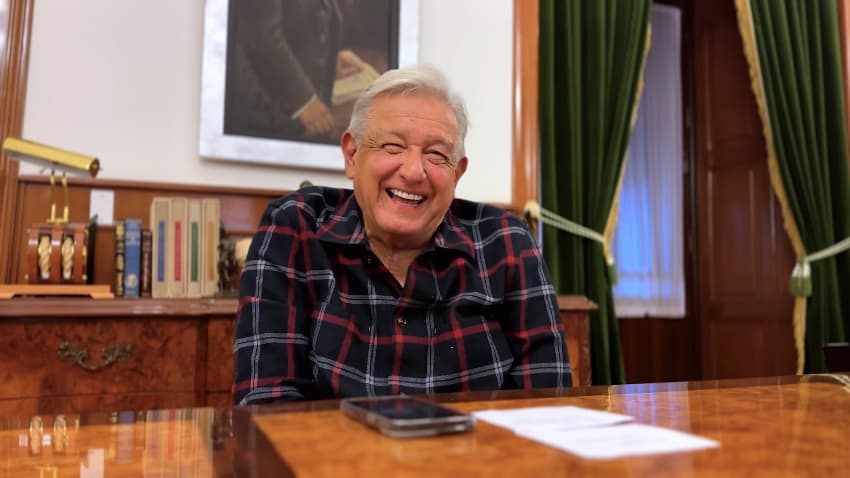
During his subsequent Q & A session with reporters, AMLO was asked whether he would ask his successor to re-present the constitutional electoral reform bill that was rejected by Congress late last year.
“I’m not going to give orders or instructions,” retorted López Obrador, who has committed to staying out of politics once his term as president concludes next year.
However, he added that if his “transformation” of Mexico is to continue, and a Morena party president “wants to finish cleaning up corruption in the country, purify public life” and “continue helping” Mexico’s most disadvantaged people, a two-thirds majority in Congress, rather than the simple one Morena and its allies currently have, “is needed” so that modifications to the constitution can be made.
In response to another question, López Obrador said that he had no problem with United States Ambassador Ken Salazar’s remark that protests in Mexico, such as those held across the country last Sunday, should be “celebrated” because they’re “part of a democracy that has an opinion.”
He subsequently reiterated his claim that there is “more democracy” in Mexico than in the United States and asserted that U.S. officials have a “bad habit” and even “an obsession” of intervening in the affairs of other countries.
“It dates back about 200 years, but I hope it will go away, it’s an illness that will go away with time,” López Obrador said.
Friday
AMLO arrived at his presser just after 7:20 a.m. and immediately advised reporters that he would visit no fewer than six states – Coahuila, Durango, Nuevo León, Jalisco, Zacatecas and Aguascalientes – over the weekend.
“It’s basically supervision of water supply projects for the people – aqueducts, diversion dams – and also evaluation of the progress of [construction] of the branches of the [state-owned] Wellbeing Bank,” he said.
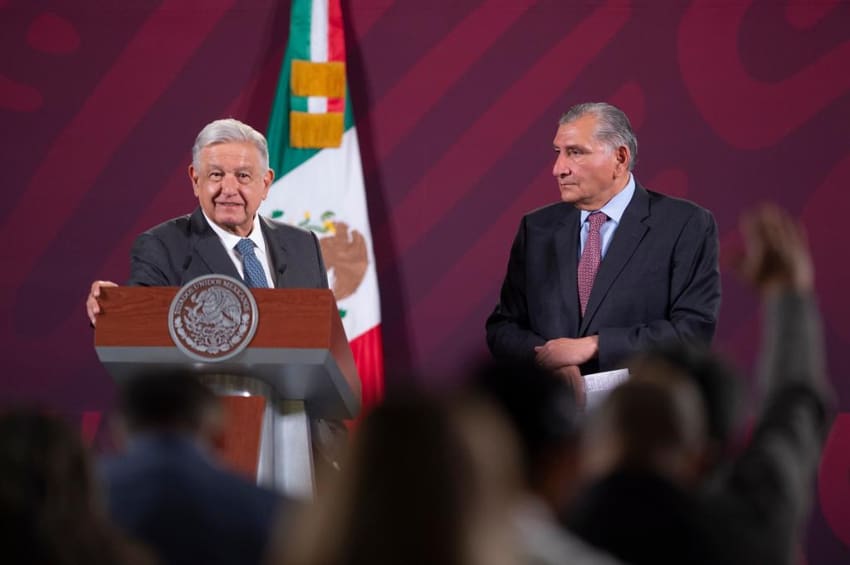
López Obrador and his interior minister, fellow tabasqueño Adán Augusto López Hernández, subsequently spent the majority of the mañanera defending the newly promulgated modifications to five electoral laws.
The “Plan B” electoral reform “has been the target of a series of attacks, of a strategy clearly designed by the opposition based on falsehoods,” López Hernández said.
“… It’s not true that powers are taken away from the National Electoral Institute [INE] or the Electoral Tribunal. On the contrary, powers that local [electoral] councils or local committees had disappear and they’re all concentrated in a single sanctioning procedure that will be regulated by … the National Electoral Institute,” he said.
The interior minister asserted that the electoral reform would put an end to the “golden bureaucracy” at INE by eliminating undue benefits for employees, and claimed that the number of dismissals of INE employees will be much lower than critics of the reform claim.
López Obrador went on the attack when a reporter told him that the Institute for Legal Research at the National Autonomous University had described the electoral reform as a “backward step.”
“When did this institute protest during the neoliberal period? … Was there any protest … when the reforms to private education and health were presented? … Did they protest when the young men from Ayotzinapa disappeared? Did they protest when due to the privatization of social security the appalling [fire] at the ABC daycare center occurred?” he asked.
“[They didn’t protest] any of them,” AMLO said before claiming that the institute’s academics are part of the old “regime” of corrupt governments. “When have they protested the [electoral] frauds? Never,” he added.
The president rejected suggestions that the reform would undermine Mexico’s electoral processes and allow the federal government to intervene in them.
“We’re democrats, because we suffered from electoral frauds, we were victims of electoral frauds like millions of Mexicans,” said López Obrador, who claimed he was the rightful winner of the 2006 presidential election.
“Now that we’re in government, it would be a contradiction to act like [former president Vicente] Fox, who became a traitor of democracy,” he said. “… This reform doesn’t affect citizens or democracy at all.”
Mexico News Daily
